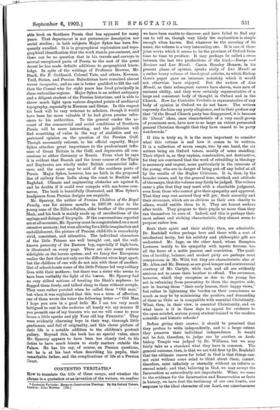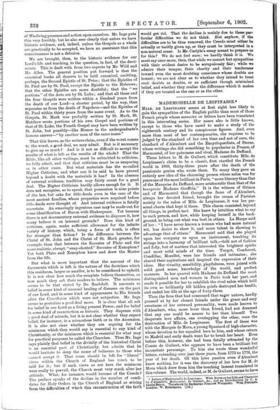CONTENTIO VERITATLS.*
How to translate the title of these essays, and whether the phrase is a quotation or an invention of the writers, we confess • Contratio Varitatia Essava in oosstriwass Disown.• By Bit Oxford Tutors. London : John Murray. [12s.] _ . _ we have been unable to discover, and have failed to find any one to tell us, though very likely the explanation is simple enough when known. But whatever be the meaning of its name, the volume is a very interesting one. It is one of those joint works which it seems to be the province of Oxford from time to time to produce. It may perhaps be called a cross between the last two productions of the kind,—Essays and Reviews and Lux Mend/. Canon Hensley Henson, in his present phase of opinion, speaks airily of Lux Mundi as a rather heavy volume of theological articles, to which Bishop Gore's paper gave an immense notoriety which it would not otherwise have enjoyed. But the writers of Lugs Mundi, as their subsequent careers have shown, were men of eminent ability, and they were certainly representative of a large and consistent body of thought in Oxford and in the Church. How far Contentio Veritatis is representative of any body of opinion in Oxford we do not know. The writers expressly disclaim any party allegiance, and in their preface say that "if the Broad Church party has disappeared, it is because its liberal' ideas, once characteristic of a very small group of prominent men, have now to so large an extent permeated general Christian thought that they have ceased to be party watchwords."
If this is truly so, it is the more important to consider what this volume is and how it comes to be written. It is a collection of seven essays, two by one hand, the six writers being six Oxford tutors, mostly of some standing. Their object is, as they explain, constructive, not destructive, for they are convinced that the work of rebuilding in theology is necessary and urgent, more particularly in the interests of the young, who are in danger of being put off any belief at all by the results of the Higher Criticism. It is, then, by the broader issues, and by the general tone, method, and attitude of the essays, that the volume may fairly be judged. The writers enter a plea that they may meet with a charitable judgment, even from those who cannot give their sympathy and approval. That they may rest assured they will get ; their sincerity and their reverence, which are as obvious as their own charity to others, would entitle them to it. They are honest seekers after truth. They propose to their pupils no more than they can themselves be sure of. Indeed, and this is perhaps their most salient and striking characteristic, they almost seem to propose rather less.
Both their spirit and their ability, then, are admirable. Dr. Rashdall writes perhaps here and there with a sort of intellectual levity, but his subtlety and Philosophic gift are undoubted. Mr. Inge, on the other hand, whose Bampton Lectures testify to his sympathy with mystic fervour, has all the force of a noble passion and conviction. The quali- ties of lucidity, balance, and modest piety are perhaps most conspicuous in Mr. Wild, but they are characteristic also of Mr. Allen and Mr. Burney, as are good temper and controversial courtesy of Mr. Carlyle, while each and all are evidently anxious not to cause their brother to offend. The reverence, however, which they recognise as due to the young lies not in refraining from presenting to them the negative side, not in leaving them "their early heaven, their happy views," but rather in lightening the burden on their consciences as much as may be by minimising the positive, and demanding of them as little as is compatible with essential Christianity. What, then, in their view, is essential Christianity, and on what basis is it in these days to appeal for credence to the open-minded, serious young student trained in the modern scientific and historic schools ?
Before giving their answer, it should be premised that they profess to write independently, and to a large extent they preserve their individual independence. It would not be fair, therefore, to judge one by another, as Arch. bishop Temple was judged by Dr. Williams, but we may fairly take as a standard what they have in common. The general outcome, then, is that we are told first by Dr. Rashdall that the ultimate reason for belief in God is that things can- not exist without some mind to think about them, cannot, therefore, exist infinitely or eternally without an infinite or eternal mind ; and that, believing in God, we may accept the Incarnation as antecedently not improbable. When we come to the evidence for the Incarnation and Resurrection as facts in history, we have first the testimony of our own hearts,: our response to the ideal character of our Lord; our consciousness
of His living presence and action upon ourselves. Mr. Inge puts this very forcibly, but he also sees clearly that unless we have historic evidence, and, indeed, unless the Gospels as a whole are practically to be accepted, we have no assurance that this consciousness is not a delusion.
We are brought, then, to the historic evidence for our Lord's life and teaching, to the question, in fact, of the docu- ments. This is dealt with from two aspects by Mr. Wild and Mr. Allen. The general position put forward is that the canonical books all deserve to be held canonical, omitting, perhaps, the Second Epistle of St. Peter; that the Epistles of St. Paul are by St. Paul, except the Epistle to the Hebrews ; that the other Epistles are more doubtful ; that the " we portions " of the Acts are by St. Luke ; and that all these and the four Gospels were written within a hundred years from the death of our Lord—a shorter period, by the way, than separates us from the death of Napoleon—and the Epistles of St. Paul within thirty years from the same event. As to the Gospels, St. Mark was probably written by St. Mark, St. Matthew wrote portions of his own Gospel and portions of that of St. Luke, the Fourth Gospel may have been written by St. John, but possibly—like Homer in the undergraduate's famous answer—" by another man of the same name."
That this leaves, as the writers claim, even if the worst comes to the, worst, a good deal, we may admit. But is it necessary to give up so much ? And is it not as difficult to accept the results of what is left as the results of the whole P That the Bible, like all other writings, must be submitted to criticism, we fully admit, and that that criticism must be as unsparing as in other cases. But what materials has the so-called Higher Criticism, and what can it be said to have proved beyond a doubt with the materials it has? In the absence of external evidence, tradition may fairly count for a good deal. The Higher Criticism hardly allows enough for it. It does not recognise, so to speak, that possession is nine points of the law, but asks for title-deeds even in the case of the most ancient families, whose properties were acquired before title-deeds were thought of. And internal evidence is fatally uncertain. An amazingly ingenious case may be made out for some identification of Bacon with Shakespeare. Yet because there is not documentary external evidence to disprove it, how many believe it on internal grounds ? Does this kind of criticism, again, make sufficient allowance for the infinite variety of history, which, being a form of truth, is often far stranger than fiction P Is the difference between the Christ of St. John and the Christ of St. Mark greater, for example, than that between the Socrates of Plato and the morerealistic, abrupt, " snap-shotted" Socrates of Xenophon P Yet both Plato and Xenophon knew and drew the Master from the life.
But what is more important than the amount of the documents which is left is the nature of the doctrines which this residuum, larger or smaller, is to be considered to uphold. It is not clear how much the essayists believe themselves, or how much they ask their readers to believe. The minimum seems to be that stated by Dr. Rashdall. It amounts to belief in some kind of unusual healing of diseases on the part of our Lord, and in some kind of appearances to His friends after the Crucifixion which were not subjective. Mr. Inge seems to postulate a good deal more. It is clear that all ask for belief in our Lord as a living present Power, and for belief in some kind of resurrection as historic. They dispense with a good deal of miracle, but it is not clear whether they expect belief, for instance, in a miraculous birth or in the Ascension. It is also not clear whether they are arguing for the minimum which they would say is essential to any kind of Christianity, or the minimum which is essential for what may for practical purposes be called the Churches. Thus Mr. Inge says plainly that belief in the divinity of the historical Christ is an essential part of Christianity, but admits that he would hesitate to deny the name of believers to those who cannot accept it. That room should be left for " liberal" views within the Church of England has much to be said for it; but if such views as are here the minimum were really to prevail, the Church must very much alter her attitude. What, for instance, would become of the Creeds P The preface speaks of the decline in the number of candi- dates for Holy Orders in the Church of England as arising from the difficulties of which this reconstruction of the faith would get rid. That the decline is mainly due to these par- ticular difficulties we do not think. But anyhow, if the difficulties are to be thus removed; the Creeds must either be actually or tacitly given up, or they must be interpreted in a non-natural sense. Is Mr. Carlyle's essay meant to prepare us for this P We do not feel sure; we hardly think it is.. We must say once more, then, that while we cannot but sympathise with their evident desire to be scrupulously fair; while we admire their temper, their charity and their tenderness toward even the most doubting conscience whose doubts are honest; we are not clear as to whether they intend to treat such doubts as doubts, or as sufficient though minimised belief, and whether they realise the difference which it makes if they are treated as the one or as the other.







































 Previous page
Previous page